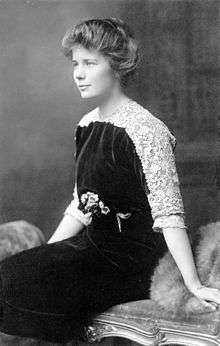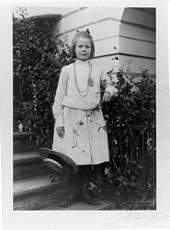Ethel Roosevelt Derby
Ethel Carow Roosevelt Derby (August 13, 1891 – December 10, 1977) was the youngest daughter and fourth child of the President of the United States Theodore Roosevelt. Known as The Queen of Oyster Bay and The First Lady of Oyster Bay by its Long Island residents, Ethel was instrumental in preserving both the legacy of her father as well as the family home, "Sagamore Hill" for future generations, especially after the death of her mother, Edith, in 1948.
Ethel Roosevelt Derby | |
|---|---|
 Ethel Roosevelt in 1912, the year before she married Richard Derby | |
| Born | Ethel Carow Roosevelt August 13, 1891 Oyster Bay, New York, U.S. |
| Died | December 10, 1977 (aged 86) Oyster Bay, New York, U.S. |
| Spouse(s) | Richard Derby (m. 1913) |
| Children | 4, including Edith Derby Williams |
| Parent(s) | Theodore Roosevelt Edith Roosevelt |
| Relatives | Eleanor Roosevelt (first cousin) Archibald Roosevelt (brother) Quentin Roosevelt (brother) Alice Roosevelt Longworth (half-sister) Susan Roosevelt Weld (grandniece) William Weld (ex-grandnephew-in-law) Robert T. Gannett (son-in-law) Adelbert "Del" Ames III (son-in-law) Franklin D. Roosevelt (fifth cousin, once removed) Kermit Roosevelt, Jr. (nephew) Joseph Willard Roosevelt (nephew) Belle Wyatt "Clochette" Roosevelt (niece) Dirck Roosevelt (nephew) Archibald Bulloch Roosevelt, Jr. (nephew) Theodora Keogh (niece) Nancy Dabney Roosevelt (niece) Edith Kermit Roosevelt (niece) Grace Green Roosevelt (niece) Theodore Roosevelt III (nephew) Cornelius V.S. Roosevelt (nephew) Quentin Roosevelt II (nephew) |
Early years

Ethel Carow Roosevelt was born in Oyster Bay, New York to Theodore Roosevelt and Edith Kermit Carow. From an early age, young Ethel Carow showed practical leadership qualities. Her father once remarked: "she had a way of doing everything and managing everybody." She quickly made her place in the family, causing upsets in her numerous fights with the sensitive Kermit. Her sensitivity also showed. When she was four, her father was reprimanding Kermit by shaking his shoulder; Ethel, with tears in her eyes said, "Shake me, Father."
She was thought to have resembled somewhat her older first-cousin, Eleanor Roosevelt. They each had soft, blue eyes, golden-blond hair but Ethel lacked Eleanor's height and had a heavier build in her waistline than did Eleanor. Many in the Roosevelt family thought her capable and charming, determined personality to be like that of her Aunt Bamie Cowles.
At Sagamore Hill, Ethel aggressively took part in all the games, and especially enjoyed horseback riding with her mother. Like her mother, she enjoyed needlework, and easily managed the younger children.
White House years

In the White House, Ethel often filled in for her mother by placing meal orders and delegating tasks to the staff. She was only 10 years old when her father became President after William McKinley's assassination in 1901.
During her family's years in the White House, Ethel always tried to keep as low a profile possible because she did not seem to enjoy the attention as much as her half-sister Alice Roosevelt did. She was also encouraged to maintain her low-key persona by her mother Edith, who believed that a woman only made the news to announce her birth, marriage and death. Ethel attended school at the National Cathedral and had difficulty making friends due to her father's position. Just months before the Roosevelts' departure from the White House, Ethel had her Debut and Coming Out Party in the White House on December 28, 1908. Ethel was just 17 at the time of her debut, one year shy of the typical age of 18 that most women "came out." The reason for this being the fact that the family was due to leave the White House less than three months following Ethel's debut. This would be last opportunity to do so if Ethel was to "come out" from Pennsylvania Avenue.
Service
During World War I, Ethel, now a nurse, served in France in the same hospital where her husband served as a surgeon. Later, she became involved with the Red Cross, and served as Nassau County Chairman during World War II, and then as Chairman of the Nassau County Nursing Service. Her long involvement, even while traveling, is shown by her correspondence still residing in the Nassau County Red Cross archives. When the Red Cross brought her Fifty Year Service Pin to Sagamore Hill, they had to correct themselves—it was not fifty years of service, it was sixty. When it came time to have her portrait painted, she did not choose to wear an evening gown and jewels, she wore her Red Cross uniform.
She put in many years of work to turn Sagamore Hill into a National Historic Site.
Ethel was one of the first two women to serve on the Board of Trustees of the American Museum of Natural History.
Marriage and family
On April 4, 1913, she married Richard Derby, a surgeon. Mrs. Derby helped his efforts in France during World War I where she served as a nurse in the American Ambulance Hospital. Ethel was the first of T.R.'s children to serve in the war.
Ethel's marriage produced four children:
- Richard Derby Jr. (1914–1922) who died at age eight of sepsis
- Edith Roosevelt Derby (1917–2008) who married Andrew Murray "Mike" Williams and resided until her death in Washington state on Vashon Island and in Seattle.
- Sarah Alden Derby (1920–1999), who married Vermont State Senator Robert T. Gannett.
- Judith Quentin Derby (1923–1973) who married Adelbert "Del" Ames III.
All of the children were raised in Oyster Bay, where Ethel was regarded as a church and community leader earning her the nickname "Queen of Oyster Bay".
Later life and death
In her later years, Derby devoted more time to the American Civil Rights Movement, a cause she had long been devoted to. She worked on a smaller scale, though no less committed than her first-cousin, Eleanor Roosevelt and believed in solving local problems before working nationally.
When she felt black residents were being discriminated against, Derby formed a committee to bring low-income housing into Oyster Bay. The proposal initially was rebuffed by most of the residents. Ethel had her friends meet at her house where she convinced them that this was a good idea and the housing project was successfully completed. A large number of black people continue to reside in these areas Mrs. Derby helped to build.
In 1960, she along with her daughter Edith, made a seconding speech for the nomination of Richard Nixon at the Republican National Convention.
By 1975, Derby was in visibly weak condition. In 1977 she made her final visit to the White House to see Jimmy Carter and his wife Rosalynn. Finally, in December, 1977, she died at the Adam-Derby House in Oyster Bay, New York, aged 86 years; she was buried in the nearby Youngs Memorial Cemetery where her parents, husband and other relatives are also buried. She was survived by her two daughters, Edith and Sarah (both now deceased), nine grandchildren (one of whom has died) and two siblings, Archie Roosevelt and Alice Longworth who both are now deceased.
Miscellaneous
- The Adam-Derby House that Ethel Derby occupied from 1913–1977 was added to the National Register of Historic Places May 17, 1979.
- Ethel Derby's niece, Susan Roosevelt Weld who was an admirer of "Auntie Ethel", named her daughter Ethel Derby Weld even though she knew the name was "out of fashion" at the time. Mrs. Derby was visited by Ethel Weld who was born only weeks before her death.
- Derby often referred to herself as "a liberal Republican."
See also
- Theodore Roosevelt, father
- Edith Carow Roosevelt, mother
- Alice Longworth, half-sister
- Eleanor Roosevelt, cousin
External links
| Wikimedia Commons has media related to Ethel Roosevelt Derby. |
- http://www.nps.gov/sahi/kids.htm
- http://www.theodoreroosevelt.org/life/familytree/Ethel.htm
- https://web.archive.org/web/20140407074018/http://www.presidentschildren.com/list.htm#26
- http://www.findagrave.com/cgi-bin/fg.cgi?page=gr&GSsr=41&GSvcid=129&GRid=5997&
- https://timesmachine.nytimes.com/timesmachine/1977/12/12/78838729.pdf
- http://www.theodore-roosevelt.com/ethel.html
